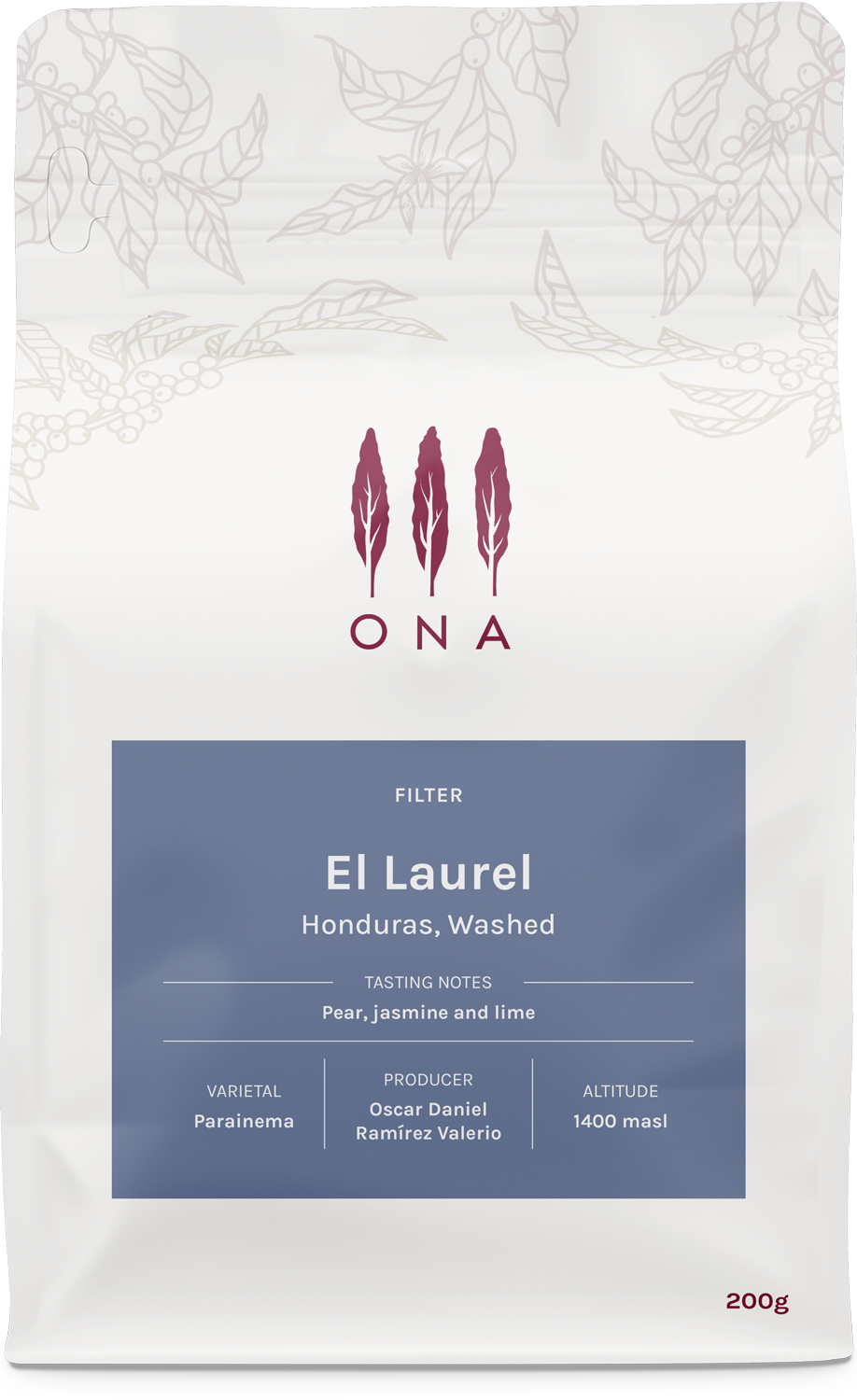

El Laurel, Honduras, Washed
- Regular price
- $20.00
- Sale price
- $20.00
- Regular price
-
- Unit price
- per
Pear, jasmine and lime
COFFEE PROFILE
This Paraneima lot from El Laurel, Honduras is bursting with notes of zesty lime, crisp pear and a floral finish of jasmine.
| TASTES LIKE | Pear, jasmine and lime |
| ROAST | Filter |
Story
Finca El Laurel, nestled in the Las Delicias community of Danlí, El Paraíso, Honduras, is a family-owned farm managed by Oscar Daniel Ramírez Valerio. Spanning about 10 hectares, with 9 dedicated to coffee cultivation at an altitude of 1,400 meters, El Laurel grows several varieties, including Catimor, Lempira, and IHCAFE-90. However, this particular lot is composed entirely of Parainema, a dwarf hybrid developed by IHCAFE. Parainema is celebrated for its natural resistance to coffee leaf rust and its complex, floral, and fruit-forward cup profile.
El Laurel gained international acclaim in 2017 when its Parainema lot won the Cup of Excellence, scoring 91.81 points, and set a record auction price of USD 124.50 per pound. This achievement put both the farm and the Parainema variety on the specialty coffee map. The processing at El Laurel follows a traditional washed method: ripe cherries are handpicked, depulped the same day, fermented to remove mucilage, and thoroughly washed before sun-drying. This meticulous approach results in a clean, elegant coffee with layered flavors of green apple, jasmine, bergamot, peach, honey, oolong tea, and citrus, supported by a silky mouthfeel and refined acidity.
El Laurel exemplifies how innovation in coffee varieties and dedication to meticulous post-harvest practices have positioned Honduras, and El Paraíso in particular, as a rising leader in the specialty coffee world. Oscar Daniel Ramírez Valerio's commitment to quality has not only elevated his farm's reputation but also highlighted the potential of Honduran coffee on the international stage.
| PRODUCER | Oscar Daniel Ramírez Valerio |
| REGION | Danlí, El Paraíso |
| VARIETAL | Parainema |
| PROCESS | Washed |
| ALTITUDE | 1400 masl |

Origin
Danli, El Paraiso
Coffee cultivation in Danlí, located in the El Paraíso department of Honduras, is deeply intertwined with the region's geography and resilience. Though now a key coffee-producing area, El Paraíso's transformation began in the late 19th and early 20th centuries when small-scale farmers capitalised on the fertile soils and favourable altitudes of 1,100 to 1,400 metres to grow Arabica coffee. In the 1980s and 1990s, support from IHCAFE introduced improved cultivars and technical training, enhancing yields and disease resistance, particularly against coffee leaf rust.
Following Hurricane Mitch in 1998, rebuilding efforts led to significant investments in processing facilities and infrastructure, furthering quality-focused production in El Paraíso, including Danlí. The region's history also reveals a transition from gold mining to coffee cultivation, as former miners repurposed land into productive coffee farms, notably in areas like Las Selvas near Danlí.
Today, Danlí and the broader El Paraíso region are recognised for smallholder-led coffee farming, producing specialty coffees from diverse varieties such as Catuai, Caturra, Bourbon, Typica, and newer hybrids like Lempira, IHCAFE-90, and Parainema. This success is supported by ongoing institutional and community innovation, solidifying El Paraíso's reputation in the specialty coffee world."
BREW GUIDE
How to get the best tasting cup
NOTE THESE ARE A STARTING POINT AND INDICATE A RANGE TO WORK WITHIN
| Age Best Used | 7-20 days after roast |
| Brew Parameters | Dose 20g in a V60 and add 300g of water in 5 pours of 60g at 90 degrees C. Start with a 60g bloom for 35 seconds then allow water to drain through each subsequent time before adding more water, aim to finish at 3:00 |
| Best Freeze Date | 7-12 days after roast |





